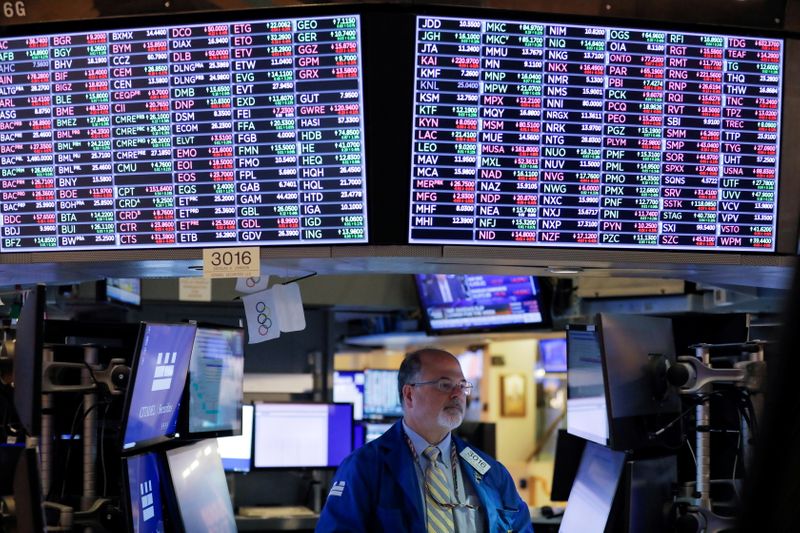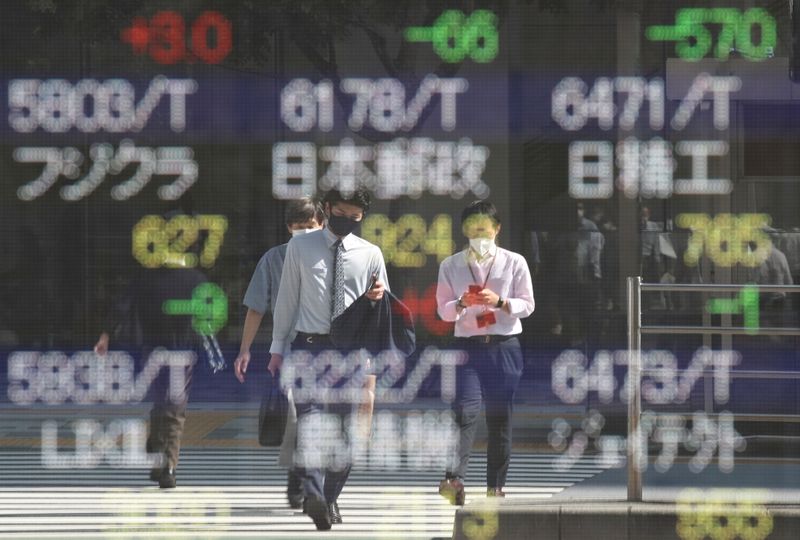By Koh Gui Qing
NEW YORK (Reuters) - U.S. shares fell on Monday, having whip-sawed between gains and losses as soaring oil prices that hit multi-year peaks stoked fears about rising prices and tighter monetary policy, lifting the dollar to a near-three-year high against the yen.
A rally in basic material and energy shares on higher oil prices initially lifted major U.S. stock indices. But the gains faded as investors focused on the start of the U.S. corporate earnings season next week.
Some analysts anticipate businesses reporting slowing growth due to supply-chain snags and rising prices. They warned that this could lead to a drop in U.S. stocks.
"Whether the final chapter of the mid-cycle transition ends with a 10% or 20% correction in the S&P 500 will be determined by how much earnings growth decelerates or has to outright decline," Morgan Stanley (NYSE:MS) analysts said in a note.
"We are gaining confidence in a sharper deceleration but the timing is more uncertain."
The Dow Jones Industrial Average lost 0.72%, the S&P 500 fell 0.69%, and the Nasdaq Composite dropped 0.64%.
The pan-European STOXX 600 index was little changed, edging up just 0.05%, while MSCI's gauge of stocks across the globe shed 0.33%.
Heading into Tuesday, the mood in Asia could also be hit by news that Chinese property developer Evergrande may miss its third round of bond payments in as many weeks and rivals Modern Land and Sinic became the latest scrambling to delay deadlines.
Oil prices, which had jumped on Monday on rebounding demand and cutbacks in supply, gave up some of their early gains but still ended the session higher. [O/R]
Brent crude rose 1.5% to $83.65 a barrel, after climbing as high as $84.60, its highest since October 2018.
U.S. West Texas Intermediate crude also added 1.5% to finish at $80.52, after touching its highest since late 2014 at $82.18.
Analysts are divided over whether energy supplies are tight enough to warrant oil testing $100 a barrel, but most seemed to agree prices are likely to stay elevated in the short-term.
That helped basic materials and energy stocks in the S&P 500. They jumped 0.96% and 0.88% respectively, Refinitiv data showed, outperforming the broader market.
Rising prices are also fueling bets that major central banks will tighten monetary policy sooner rather than later, lifting the dollar to a near three-year peak against the Japanese yen.
In the United States, investors expect the Federal Reserve to begin tightening policy by announcing a tapering of its massive bond-buying next month. This has hobbled the yen, which is typically sensitive to interest-rate differentials.
The yen weakened 1.02% against the greenback at 113.38 per dollar, and the dollar index rose 0.238%.
A stronger dollar pushed the euro down 0.14% to $1.1551.
Gold, usually seen as a hedge against inflation, fell as a stronger dollar offset any inflation-driven gains. Spot gold dropped 0.2% to $1,753.42 an ounce. U.S. gold futures fell 0.15% to $1,753.60 an ounce.

Bitcoin, a barometer of investors' risk appetites, receded a touch but was still up a solid 4.4%.
Oil vs US stock market in 2021 https://fingfx.thomsonreuters.com/gfx/mkt/jnvweweglvw/Pasted%20image%201633718533077.png
